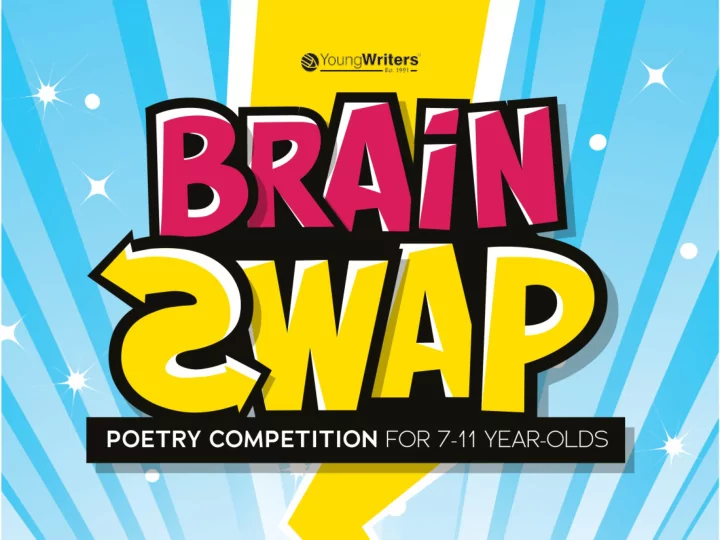

POETRY COMPETITION FOR 7-11 YEAR-OLDS
TODAY YOU ARE GOING TO: • Learn how to write from a different perspective • Take part in a group discussion • Explore poetic techniques and types • Write a poem for Young Writers’ Brain Swap poetry competition
Today you will be writing a poem inspired by a brain swap: Your teacher may give you an idea to write about or ask you to choose.
Poetic techniques are writing tools that make your poem more interesting to read. Here are our top 3 techniques: IMAGERY SIMILE ONOMATOPOEIA Using description, Describing A word that names a particularly senses, to something like or as sound, but also paint a picture in the something else. E.g. sounds like that reader’s mind. E.g. sound! E.g. I burst into a sprint, The sky was as fast as a Rustle! Whoosh! pitch-black except for speeding train, I Rustle! I’m just a the bright, twinkling crossed the finish leaf, fallen in stars that I watched line, World autumn, gently as I floated inside the Champion! blowing along in space station. the breeze...
Here are some sentences about the Queen, can you identify whether each sentence is either a simile, imagery or onomatopoeia: The Queen’s guards are as brave as a lion. The Queen’s ballgown swooshed around her as she walked through the palace. The Crown Jewels sparkled and glinted in the sunlight as Her Majesty gracefully sat down on the throne.
Poetry types are styles that you can write in... There are lots of poetic forms to choose from, but here are 3 we’ve shortlisted: RHYMES Do you know what a rhyme and a half rhyme are? In case you didn’t know, a half rhyme is a similar but not identical sound. E.g. ‘Egyptian’ and ‘description’ rhyme but ‘Egyptian’ and ‘kitchen’ are a half rhyme.
Can you guess if these are half rhymes or rhymes? 1. I’m a cute puppy With a soft, furry tummy 2. I’m floating in space It’s an amazing place 3. I’m a ferocious Viking And my life is very exciting! 4. I’m a dinner lady I work lunchtimes daily 5. Hello I’m a doctor To relax I play soccer
RIDDLES Writing from someone or something else’s point of view is perfect for riddle poems… a mystery guest for the reader to work out! A good riddle poem ideally: • Has at least 6 clues • Uses present tense • Uses lots of description • Tries to trick the reader • Has a clever title that gives away a clue • Finishes with the question – who or what am I?
Can you guess who these riddles are about? Who’s Afraid of the Big Bad Wolf? (A kennings poem) Forest-skipper Flower-picker Cake-maker Rule-breaker Question-asker Wolf-unmasker Granny-saver Woodcutter-waver… Who am I?
Superhero Riddle I wear a suit by day, a cape by night, I like to give bad guys a fright. My name is blind, but I am not, My enemy likes to laugh a lot. My partner is named after a bird, We’ll save the day, I give you my word! Who am I?
ACROSTICS By writing the name of your brain swap as the acrostic word, you can then have fun telling the reader about your person... E.g. T he reason I became a teacher was to make a difference to children's lives, E very day I help them become better students, I love to see them grow A nd develop, though I could live without their burps and trumps! C hatter, laughter, tears, excitement, fear - I see it all but I H ave to tell you, being a teacher is so rewarding, E very day my class surprise me... “R eally Morgan! I've told you before, don't lick the pencil sharpenings!”
Now you are ready to get writing! If you have any questions, now is the time to ask your teacher! It’s time to write your Brain Swap poem!
It’s peer assessment time! Share your work with a partner. They are to give you a suggestion on how to improve your poem and let you know what they liked about it. You then do the same for your partner. Edit your work if necessary!
Recommend
More recommend